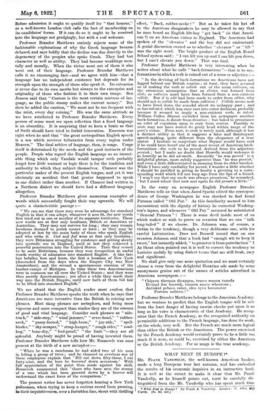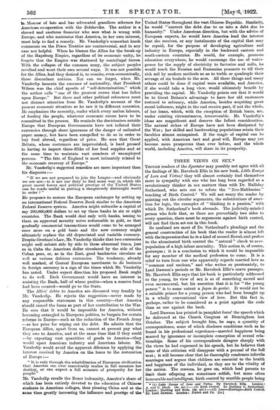WHAT NEXT IN EUROPE ?*
Mn. FRANK VANDERLIP, the well-known American banker, made a long European tour last autumn, and has embodied the results of his economic inquiries in an instructive book. It is well at the outset to make it clear that Mr. Frank Vanderlip, as he himself points out, must be carefully die tinguished from the Mr. Vanderlip who has spent much time • What lied in Europe S By Frank A. TanderlIp. London: °win. lea. OA. net.] G. Allen CRii in Moscow of late and has advocated grandiose schemes for American co-operation with the Bolsheviks. The author is
shrewd and cautious :financier who sees what is wrong with Europe, and who maintains that America, in her own- interest,
must help to find a remedy. Mr. Vanderlip's. somewhat harsh comments -on the Peace Treaties are -controversial, and, in any
case not helpfuL When he blames the Allies for the break-up of the .Hapsburg Empire, regardless of its economic unity, he forgets that the Empire -was shattered by centrifugal.forces. With the collapse of the common army, Ahe subject peoples
revolted-and went their own several ways. -It was not possible for the Allies, had they desired it; to reunite, even econornioally,
those discordant nations. Nor can we forget, when Mr. Vanderlip laments the excesses of nationality, that President Wilson waa the chief apostle of " self-determination," which the author calls " one of the greatest curses that has fallen upon Europe." But these and other political.-references must not distract attention from Mr. Vanderfip's account of the present economic situation as he saw it- in different -countries.
He emphasizes the neoessity, under whibh every nation labours, of feeding the -people, whatever economic errors have to be
committed in the process. He reminds the doctrinaires outside Europe that European Governments have not inflated their currencies through sheer ignorance of the danger of unlimited paper .money, hut have been compelled to do -so in order' to buy food abroad, - regardless -of price. He sees that ' Great Britain, whose customers are impoverished, is hard .pressed in having .to import -three-fifths -of her food supplies and :at the same time 'to 'maintain vast numbers of unemployed
persons. "'The late of England is most intimately related to the-economic recovery of Europe."
Mr. VanderliVe suggested_ remedies are-more important than
his diagnosis:— "-If we are not:prepared to -join the League—and obviously we are not--is it not our duty- to find some way in which the great moral forces and political prestige of the United States can- be -made= useful in putting s 'dangerously 'distraught world in order 7 " Ile propose:al to restore the European exchanges by setting up an international Federal ..Reserve' Bank similar to the American Federal. Reserve system. America might subscribe a. capital of say 200,000,000' dollars to: set up these banks in six or eight countries. The -Bank would deal only with -banks, issuing 'to them on approved security notes redeemable in gold, so that gradually commercial transactions would come to be arranged once more -on a gold -basis and the new currency -might
ultimately replace the old depreciated .and variable currency. Despite Gresham's Law, Mr. Vanderlip thinks that two currencies might well-subsist side by side in these -abnormal times, just
as in Cuba the American dollar circulated by the side of the Cuban peso, --or, as in the East, good banknotes circulate as well as various dubious currencies. The tendency, already well marked, of.Central European merchants to do business in foreign currency-is a sign of the times which Mr. Vanderlip has noted. Under expert direction his proposed Bank ought to do well. Each Government would have an interest in
assisting the Bank, half of whose profits—when a reserve fund had been created—would go to the State.
The Allies' debts to America are discussed very frankly by Mr. Vanderlip. He rejects the suggestion—never made by any responsible statesman in this country—that America should cancel the loans as part of her contribution to the War. He sees that it would be impossible for America, without becoming entangled in European politics, to bargain for certain reforms in Europe—such as the reduction of the French .Army —as her price for wiping out the debt. He admits that the European 'Allies, apart from us, cannot at present pay what they owe to America, and at the same time that if they could —by exporting vast quantities of goods to America—they
would upset American industry and American labour. Mr. Vanderlip would avoid the apparent dilemma by applying the'
interest received by America on the loans to the restoration of Europe :—
-" It is only through the rehabilitation of European civilization that America can ever conceivably realize in full measure- her destiny, or can expect a full measure of prosperity for her Peolku.
Mr. Vanderlip recalls the Boxer indemnity, America's share of
which has been entirely devoted to the education of Chinese students- in American colleges, thus pleasing China and at the
-same- time greatly increasing the influence and prestige of the United States throughout the vast,Ohinese.Republic. Similarly, he would "convert the debt due to us into a debt due to humanity." Under American -direction, but with, the advice: of European experts, he would have America lend the interest that she receives, 'or any •instalments of the capital that may be repaid, -for -the purpose of developing 'agriculture and industry in Europe, especially in the backward eastern and south-eastern countries. He mould, for example, promote education everywhere, be would encourage the use of water- power for the supply of electricity to factories and mills, he would teach the Russian and Rumanian peasants to till their rich soil by modem methods so as to treble or quadruple their average of six bushels to the acre. All these things'and many others could be done if capital were available, and -America, if she would take a long view, would - ultimately benefit by providing the capital. Mr. -Vanderlip points out that it would be to Great Britain's advantage to have her old customers restored to solvency, while America, besides ,acquiring great moral influence, might in the end receive part, if not the whole, of her loans, -which, with the exception of British loans, are, under existing circumstances, irrecoverable. Mr. Vanderlip's ideas are magnificent and deserve the fullest consideration. The natural riches of Europe 'have not been dissipated by the War ; her skilled and hardworking populations retain their faculties almost unimpaired. If the -magic of capital can be applied, with American tact and good will, Europe may yet become more prosperous than ever before, and the whole world, including America, will share in its prosperity.



































 Previous page
Previous page